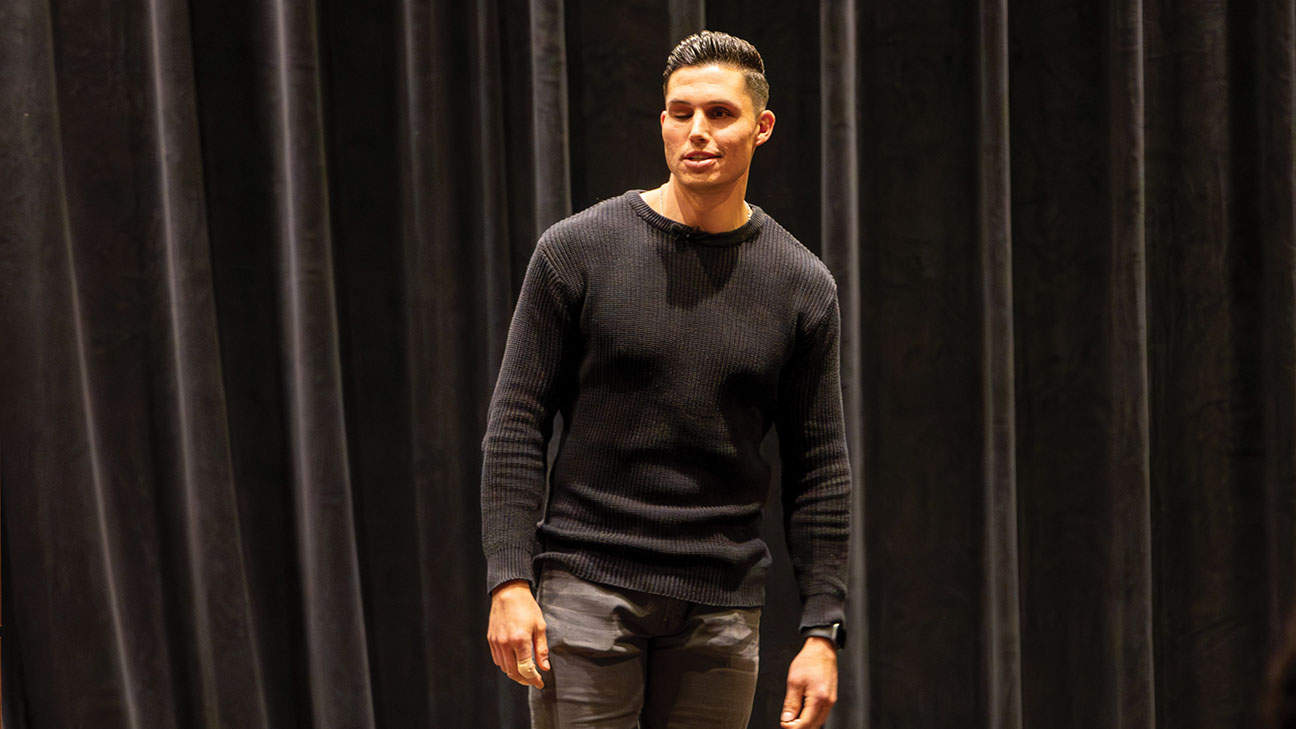
Former Major League Baseball player, Drew Robbins, shares his story during the Annual Mental Health and Substance Misuse Conference hosted by the Choctaw Nation.
Drew Robinson shares his story of survival
Published May 3, 2024By Christian Toews
“Strength isn’t always physical…the hardest thing I’ve ever done in my life is be vulnerable.” – Former MLB Player Drew Robinson.
Drew Robinson shared the story of his decline in mental health and his attempted suicide with attendees of the Annual Navigating Mental Health and Substance Misuse Conference hosted by the Choctaw Nation in March. However, instead of a story of tragedy, he shared a story of hope.
The decision that was supposed to be the end of Robinson’s life gave birth to a new passion for spreading awareness about mental health and suicide prevention.
The former Major League Baseball player has shared his story with the world since his suicide attempt in 2020. He has been featured on ESPN, USA Today and other significant outlets.
Although Robinson was a successful baseball player and had many things that most only dream of, he said that he was struggling with his mental health like everyone can. When the pandemic forced him to spend time alone, he was confronted with the reality of his mental health.
“I knew where I was, and I knew how unwilling I was to admit it because I was terrified of being judged by some hypothetical person,” he said. “I was so afraid of being judged or misunderstood, really, of how could someone who is living the life I’m living be feeling this way.”
Robinson emphasized one of the most challenging parts of mental health treatment. Many people struggle with thoughts of self-harm but don’t talk to anyone.
According to the Centers for Disease Control (CDC), in 2021, an estimated 12.3 million American adults seriously thought about suicide.
Robinson drove this point home when he spoke about how he was seeing a therapist but not being completely honest with them. He encourages everyone to be honest with their mental health and not wait to seek help.
“No matter how irrational it sounds, dramatic it sounds, extreme it sounds, unrealistic, just say it. I regret that more than my actual attempt,” he pleaded. “My attempt wouldn’t have happened, I strongly believe, if I would have been honest in those therapy sessions.”
Robinson’s story highlights the importance of accessible mental health programs and treatment. Within the Choctaw Nation, steps are being made to offer programs that address mental health in practical ways and prevent suicide.
American Indians and Alaska Natives face disproportional rates of mental health disorders, including suicide, according to the CDC.
The Choctaw Nation of Oklahoma (CNO) is doing everything possible to provide Choctaws with adequate resources and care. By partnering with state and local programs and facilities, Choctaw Nation Behavioral Health Services offers preventative care and treats tribal members in crisis.
There are many behavioral health services offered through CNO’s programs, including individual and family counseling, substance abuse counseling, child/partner abuse counseling, psychiatric medication (evaluation/ management), crisis intervention, suicide prevention and more.
One of the partnerships is with the 988 Suicide & Crisis Lifeline. 988 is a resource for individuals who are feeling depressed, anxious, overwhelmed, suicidal, or struggling with a substance use issue. Mental health professionals will listen to you and assist in getting you the help you need for yourself or a loved one. They will also assist with connecting you to available resources in your area.
“Many people don’t know where to turn when they are in crisis,” says Andrea Holley, Project manager for CNO’s 988 tribal response and expansion grant.
“The purpose of these grants is to focus on community outreach and what to expect when you call 988,” she said. “We provided tribal members coming out of inpatient with follow-up services and brief therapy until they could get in to see our traditional counselors.”
Historically, following up with people who have called 988 for assistance has been challenging. After someone is treated, they can be discharged and forgotten. This has been particularly difficult with tribal members because many don’t want to seek treatment outside of the reservation, according to Holley.
“This grant also allows us to not lose connection with our tribal members. We are going to know when they are discharged,” said Holley.
“We are going to make sure we get an appointment made with them, and we are going to make sure that they are ok and get the help they need afterward to keep them out of crisis,” said Holley.
Holley said that since she became the project manager in 2023, she has seen the grant streamline the process, where there used to be a lot of barriers to getting tribal members the higher care they needed. She said some notable partnerships developed are with Lighthouse Behavioral Wellness Center and Carl Albert Mental Health. These partnerships provide services that were previously unavailable to tribal members.
Getting help before reaching the point of suicidal thoughts is very important,” said Holley.
According to Holley, many people underestimate the severity of a mental health crisis.
“If we really understood what a mental health crisis was, we have all been there at some point. Don’t wait until you are suicidal,” said Holley. “There are so many mental health crises that lead to that point. Call when you need the help, and you know you need the help.”
If you or someone you know is struggling with mental health, 988 is a resource that could save a life. If you would like more information visit the 988 Suicide & Crisis Lifeline website.
If you would like more information and resources that the Choctaw Nation of Oklahoma offers, visit a summary of Mental Health available options or our Behavioral Health webpage.

